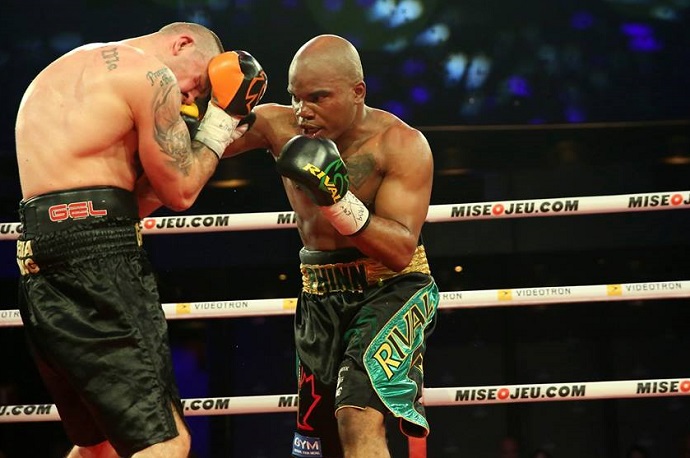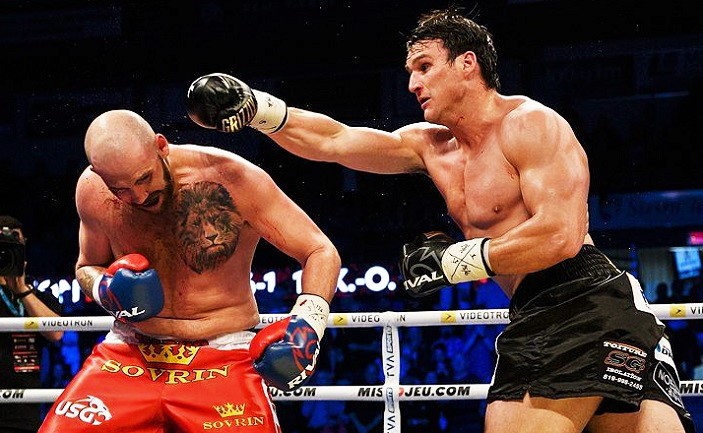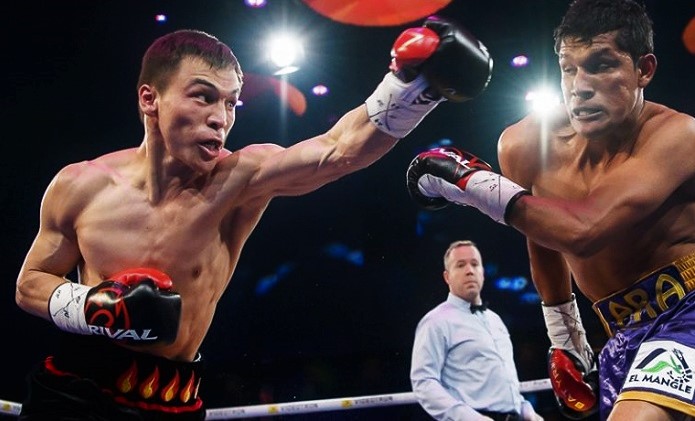Flawless Fight Night
Groupe Yvon Michel hosted another boxing gala on Thursday at the Montreal Casino, which turned out to be unlike any pugilistic event I might have imagined. The venue itself set the tone for the spectacle’s strange, discordant ambiance, the casino’s Cabaret Room exuding refinement and modernity while the fights offered a throwback to the rough-and-tumble spirit of boxing’s golden age. The lighting scheme had the crowd, seated at elegant dining tables around the ring, bathed in red light, while the theatre’s outer edges were suffused in blue, the lighting scheme taking on a thematic purpose that, while perhaps not intentional, struck an apposite contrast: the venue’s cold extremities enclosed the bloody heat at its centre, as if the lighting embodied the spirit of a boxing champion: cool on the outside, hot on the inside.

Further, from the ceiling hung rows of LED lights in the form of flame-blue discs that resembled the thrusters of a giant alien spacecraft. The venue’s sophisticated aura merged with an eerie, otherworldly feeling brought on by the martian discs, which were contrasted yet again by the earthbound calm and reserve of the fight fans, devoid as they were of the aggressive posturing I had come to expect of a standing-room-only boxing crowd. Compounding all this exuberant strangeness, at a few minutes to seven, nearly everyone seemed to show up at the same time, quietly and sedately taking their seats. Perhaps to one-up the crowd’s impressive punctuality, the first fight started at seven on the nose.
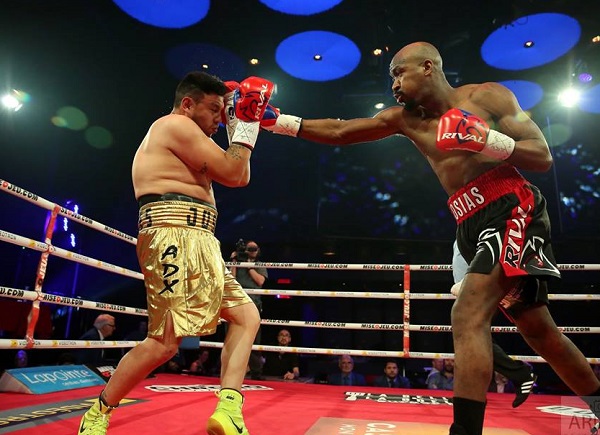
Longeuil native Terry Osias secured a solid points victory in his middleweight bout against Mexican Jose Napoles, whose pear-shaped body with his gut hanging over his trunks didn’t bode well for his chances. The fight went the distance of four rounds, but Osias dictated its pace and rhythm from the start, stalking Napoles around the ring and forcing him against the ropes where he landed powerful combinations of left jabs followed by right hooks to the head and body. Osias looked focused and confident throughout, while Napoles, clearly out of shape, kept on panting, his mouthpiece jutting from his lips, his guard always down, and so Osias took full advantage of the invitation to use his opponent as target practice.
The organizational efficiency of the gala continued to surprise me when the next fight, a cruiserweight contest, started immediately after the first one. Granby native Yan ‘‘Wild Thing’’ Pellerin won by unanimous decision against Mexican Jesus Beltran, who had a large hook nose and thick folds of back fat. Pellerin, by contrast, was stocky and neckless with a shock of dark hair curling up at the front and shaped like the tip of a surfboard. Indeed, he cruised to a solid points victory by persistently countering Beltran’s clumsy haymakers with crisp though not especially crushing blows, save for a huge left hook in the fourth and final round that caused Beltran’s outsized nose to pour blood.
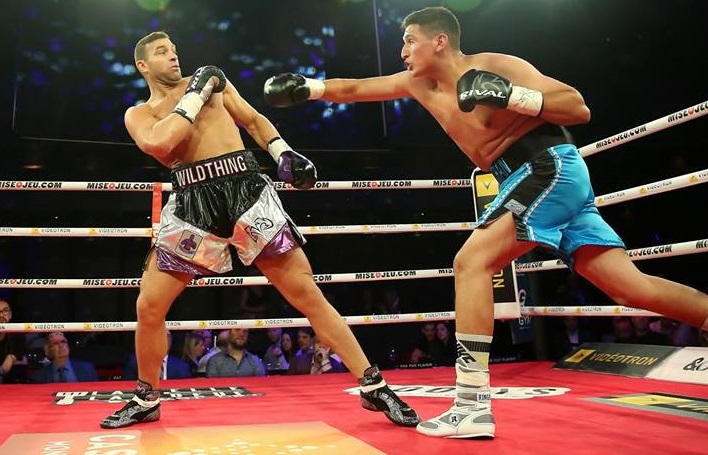
Once again the next fight followed immediately on the heels of the previous one. It proved to be the first to provide something of a contest, in which super-middleweight Longeuil native Louisbert ‘‘Ti Kouto’’ Altidor scored a hard-won fifth round TKO victory over Guillermo ‘‘Memorias’’ Romero Flores of Mexico. Altidor wasted no time in taking control of the fight, crouching low in a defensive guard while cutting off angles and always backing his opponent into the ropes, where he bludgeoned him with a steady stream of jabs followed by heavy right hands.
Flores somehow survived the onslaught but endured a sustained beating, and he seemed to earn the respect of the crowd for his capacity to take punishment, a cut above his eye gushing blood. In the fifth round, Altidor dazed him against the ropes with a whooshing right uppercut, inspiring someone in the otherwise silent crowd to shout, ‘‘Finish him!’’ So Altidor followed his uppercut with a cannonade of right and left hooks, his opponent helpless against the ropes and crumpled behind his guard, until the referee wisely stopped the massacre.
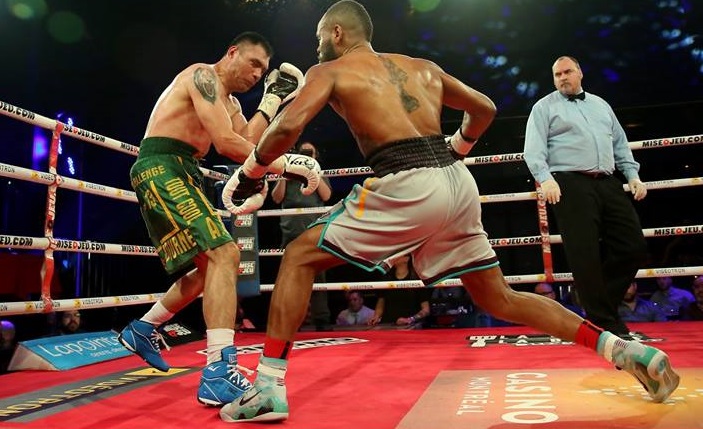
The next match offered an even faster and more effective finishing blow, this one from hometown favourite Christian ‘‘Solide’’ Mbilli. His opponent, the Argentine Luis Eduardo Paz, was nicknamed ‘‘El Pollo,’’ or ‘‘Chicken,’’ which struck me as an inauspicious nickname for a supposedly fearless boxer. While he didn’t perform like a coward, he did look overly relaxed and distracted as he entered the ring, leaning against the ropes while chatting and joking with his ringside team, his lack of muscular definition and his salt and pepper stubble projecting the look of a man who seemed like he was about to take a beating from a much younger and leaner opponent with a facial expression oozing confidence and concentration.
The fight ended quickly, not even two minutes into the first round when, having backed the Argentine into a corner and unleashed a salvo of power punches, Mbilli dropped him with a thundering straight right to the body. Paz stayed down on one knee until the referee stopped the fight at 1:44 of round one. The crowd, duly impressed by the flawless performance of their hometown hero, clapped and cheered far more than for any of the earlier fights. I certainly shared in their enthusiasm at having witnessed, albeit briefly, the superior skill, speed, and intelligence of Mbilli, an undefeated prospect who seems destined to become a champion.
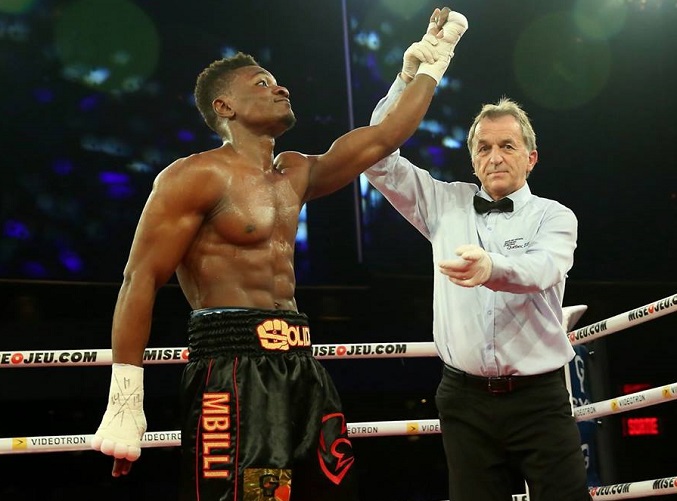
The first four fights had flown by at lightning speed, so the intermission which followed served as an opportunity to reflect on how unique this boxing gala had been up to now, the atmosphere a potent confection of casual reserve, classy urbanity, and ethereal weirdness. Despite the VIP setting, nearly everyone was dressed informally, notwithstanding a few suits and ties and bust- and hip-hugging dresses. Even the ring ladies remained demure and inconspicuous, most of them blond and in black spandex crop tops with matching hot pants and stilettos, appearing only to prance around the ring with the round cards, then disappearing, never distracting the crowd from the fights by, for example, tossing promotional t-shirts at them.
The fans comprised a fairly even distribution of Latinos, Asians, blacks and whites, about two-thirds of them men, each group remaining seated at their tables throughout the gala, those on the balcony also never once rising to their feet. The whole scene effused a mood of supernatural pleasantness, right down to the bracingly oxygenated and nearly odourless air in the auditorium, its antiseptic freshness the only reminder that we were in a Vegas-style casino. It was so unexpected to watch an apparently violent and bloody boxing event in such a pristine venue that I thought I must be dreaming and by the time the fifth fight started, I still wasn’t used to the fairy-tale pairing of contrasting features.
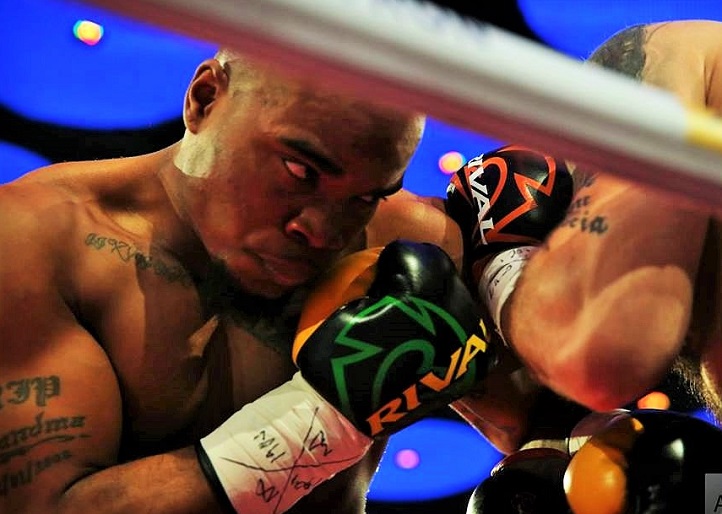
In the penultimate bout, a spirited super-middleweight contest, Shakeel ‘‘The Jamaican Juggernaut’’ Phinn defeated Polish champion Bartlomiej Grafka by unanimous decision in a dominant performance that should erase anyone’s doubts about his having redeemed himself after his upset loss in his last fight. The two competitors offered far and away the most active and competitive fight of the night, though Phinn took control from the beginning with a simple but consistently effective technique of luring Grafka toward the ropes, encouraging him to unleash a barrage of punches, only to side-step them and unleash his own flurry to drive Grafka back toward the center of the ring.
But Grafka was relentless and Phinn had to pull out all the stops, which he gamely did, the crowd unexpectedly erupting with shouts of ‘‘Go Shak!’’ and ‘‘C’mon Shak!’’ A determined Grafka delivered a few worthy combinations of his own, the two fighters with similar styles, arms up high and heads defensively tucked behind them, always trying to press forward and back each other into the ropes. Given how patient Phinn remained throughout the fight, it was evident that he respected the skill and power of his opponent. But in the fourth, Phinn scored his first significant blow, a devastating right cross that snapped Grafka’s head back. And in the sixth he connected with a battery of power punches that sent Grafka reeling into the ropes and knocked his head left and right, sweat spraying from his head like water from a rotating sprinkler.

Grafka bravely endured the assault and the fans brimmed with audible excitement which endured until the dwindling seconds of the eighth and final round, when Phinn landed a spectacular right-hand lead, followed by a laser-like right uppercut that staggered Grafka into the ropes. He survived a possible KO by holding on for dear life, his face and stomach swollen and red as raw meat. Like the other eight fighters before them, Phinn and Grafka embraced amicably after the final bell, gently patting each other’s backs and stomachs and sharing kind words in a genuine display of respect and admiration. The clear and unambiguous affection and camaraderie that all of these fabled warriors shared only added to the mythical atmosphere of the gala.
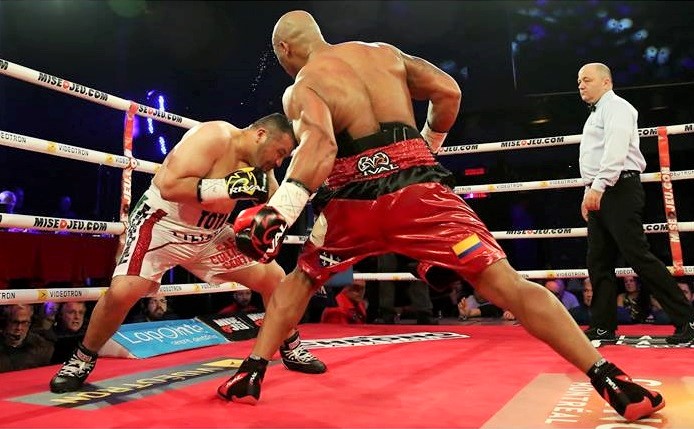
And so the brief, one-sided nature of the final fight and main event proved far less disappointing than it might otherwise have been. In the evening’s only heavyweight bout, hometown hero Oscar ‘‘Kaboom’’ Rivas quickly dispatched San Diego native Sergio ‘‘Tota’’ Ramirez. The mismatch was clear before the fight had even started. Ramirez had a flabby tub-shaped body and when he crouched into his fighting position and tried to weave left and right, his pasty belly folded over his trunks, lolling to and fro like a tongue. Rivas, bulky and ripped and fully a head taller than his opponent, blasted Ramirez into the ropes with stunning combinations. Ramirez was helpless and I felt like I was watching a python devour a gerbil. So fierce and relentless was Rivas’ aggression that at the end of the second round, Ramirez’ corner threw in the towel.
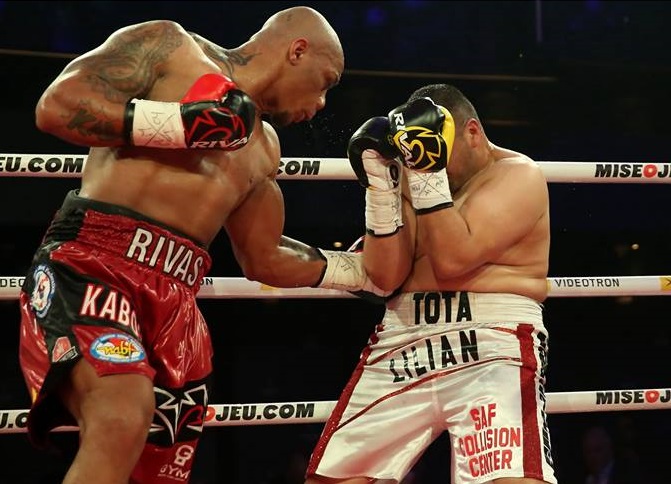
I was about to make a hasty exit when a young usher in a grey suit and black tie with an immaculate blond coiffure crouched down in front of me to let me know that Rivas would be answering questions from journalists in the wings beside the press galley. He did so smilingly and with such earnest politeness that it reminded me of how agreeable and strangely tranquil and harmonious the whole evening had turned out to be, and so I left the Cabaret Room with a certain lightness of step, wandering into the casino littered with hordes of loud, rambunctious gamblers and the grating cacophony of slot machines.
Nonetheless the obnoxiousness of the gamblers and the din of the machines faded almost to silence, edged out of my mind by the cheerful memories of a singular boxing gala that featured impeccable organization, a generously beatific crowd, at least three competitive and entertaining fights, no macho posturing from the fighters, who consistently expressed a mutual amity, and an idyllic venue that conveyed a series of unlikely contrasts: an atmosphere at once intimate and cosmic, casual and elegant, violent and peaceful. Groupe Yvon Michel had put on the most oddly incongruous yet exhilarating boxing gala I had ever witnessed, so much so that it might have drifted from the pages of Grimm. — Marko Sijan
Photos by Ariane Théberge.

